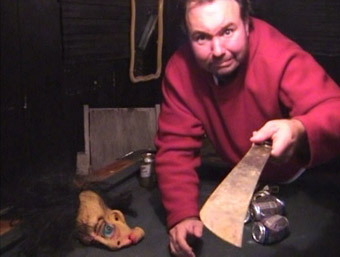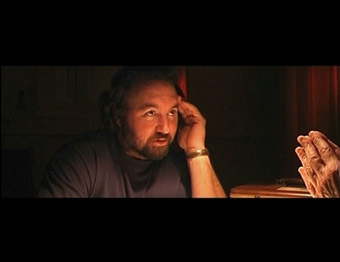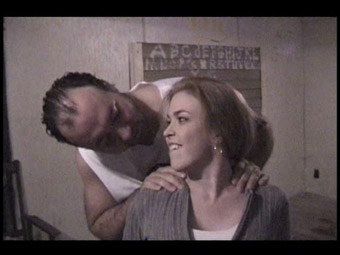|
A
few years ago, in an attempt to discourage media students
from making the same damn films that media students always
seemed to make, some colleagues and I drew up a list of
the most tiresomely familiar outlines for student productions.
These were then read out to the assembled new intake as part of their very first
lesson with the warning that turning in a film from this
list would qualify its maker for some serious ridicule.
One of the prime ones was, and should always remain, doing
your own half-arsed version of the cult film of the moment.
Now you have to realise that at this point we were in the
wake of the success of The Blair Witch Project,
and exam moderators across the country were holding their
heads in their hands in despair at the number of crappy
Blair Witch knock-offs they had to sit
through, each one featuring a group of students stumbling
about in the woods with two cameras (one shooting colour,
the other black-and-white), finding decidedly un-creepy
objects, then dying at the hands of an unidentified figure,
dropping the camera to the ground on the last shot. Honestly,
there were thousands of the buggers. This creativity void
was not new. For some years we had been alternately groaning
and sniggering at the sight of students dressing in suits
and killing each other with hopelessly poor American accents
because they only film they'd watched more than once was
Reservoir Dogs, and they all wanted so
much to look as tough and cool as Mr. White. Unsurprisingly,
none of them ever did.

Mind
you, they're not the only ones doing it. Almost from the
moment there's an unexpected movie hit, the studios are lining
up to make their own versions of the same, while several
independent directors have made their first mark with an
alternative take on a successful or reputable work of another.
With that in mind, there seems little doubt that director/actor
Scott A. Martin is a fan of John McNaughton's memorable
debut feature, Henry: Portrait of a Serial Killer.
Like McNaughton, Martin aligns us with an amoral killer
and offers a window into his world, here via an interview
conducted with murderous sociopath
Michael by an ageing reporter. Claiming to have killed a total of 47 people, mainly
young women, Michael has kept a video tape record of his
activities, which include everything from
extensive footage of his basement porn video production
work to records of the murders themselves, a selection of which he has brought with him
for the reporter to watch.
Hurt
is shot on what looks like a combination of mini-DV and
Hi-8, but given that it is largely composed of Michael's
own home movie records of his thoughts and deeds, this is
visually appropriate, and it could well be that the story
and structure grew in part out of these technical restrictions.
This in itself is fine. Considerably more confusing is Martin's
decision to hop randomly and unproductively through no less
than six different aspect ratios, with much of Michael's
footage curiously presented in scope, a ratio alien to domestic video cameras. Such stylistic game-playing inevitably
detracts from the documentary feel created by shooting on
low band video in the first place. There are also several
shots, including a notable one in the early woodland hunt,
that could not have been filmed by Michael or any of his
cronies without the fleeing victim spotting that there was
a camera stuck right in their face.
But
the real problem here is one of content and structure. While
the idea of telling the story of a self-confessed serial
killer through his own home movies is sound enough, the
genre's own dark lineage means that those home movies really
need to deliver the goods, and for the most part they don't. Michael's chats to camera create the sense of a man
who likes to pretend he's a dangerous killer rather than
one who is, while the some of the recorded episodes ramble
slowly and aimlessly down a path to nowhere. This is particularly
true of footage of young, would-be porn actresses in audition,
sequences that play out in sometimes laborious real time,
which is fine for authenticity but deadly for film drama
and narrative progression.

As
things progress, so to speak, we get to meet Michael's collaborators
and the touchstones multiply, with references to both The
Texas Chainsaw Massacre and Man Bites Dog,
the unique and disturbing impact of either Hurt
can only dream of emulating. In the thirty years since Hooper's
groundbreaking genre classic raised the horror bar, we've
been disturbed by Se7en, convinced of the
reality of The Blair Witch Project, and
exposed to the visual nastiness of Hostel
and its ilk, to quote but three. Any subsequent movie looking
to tread similar dark psychological or visceral ground needs to
be prepared to seriously push the envelope, and that's something
that Hurt never does. Michael kills and
Michael rapes, but the acts themselves are largely inexplicit
and the suffering they cause barely registers, too often
lost in a montage or distilled by a score so inappropriately
busy with groaning rock tracks (including a cover of the
Talking Heads' Psycho Killer, of course) that I
began to suspect that the film was designed in part as a
promo for a friend's as-yet unsigned band.
The
psychology of Michael's behaviour remains equally unexplored,
his interview with the reporter a missed opportunity to
get inside the head of a man who has an almost indifferent
attitude to killing and who agrees to the interview more
out of curiosity or boredom than the more expected ego kick.
The reporter in particular gets precious little to work
with, reduced largely to mundane questions and brief appearances
to shake his head in disapproval at the tapes we are intermittently
reminded he is watching.
Just
occasionally, Hurt creates a feeling of
creepy authenticity when the seemingly unrehearsed performances
hit the right note of naturalism, with director Martin doing
rather well as Michael, particularly in the quieter, almost
offhand moments. But in other respects, the film's ramshackle
structure and occasionally wobbly continuity reminded me
of an extended student film, its unfocussed improvisation
and a lack of editorial discipline allowing sequences to
drift on way past when they have served their narrative
or character purpose. Shot on video on a low budget and
free from studio enforced restrictions regarding content
and morality, Hurt could – indeed should – have taken us to dangerous and uncomfortable places, made us
squirm in our seats and question whether we actually want
to watch what it was daring to show us. It may seem perverse, but
this is exactly the sort of film that I look forward to
being disturbed by, and Hurt just doesn't
come close.
Hurt
was shot partly on digital video, probably mini-DV or DV-CAM,
which generally looks fine, with the contrast and sharpness
of the expected quality and the black levels solid. Some
of Michael's own footage appears to have been captured on
lower band analogue video, which exhibits considerably more
noise and weaker contrast than the DV sequences. Inevitably
there are some very visible digital artefacts in some shots,
but the unmistakable video look is just right for the material.
The use of six different aspect ratios has been preserved
through a 4:3 transfer with the various widescreen crops
windowboxed within.

The
Dolby 2.0 mono track is not the best mix in town, with little
if any Foley work and some jolting variations in volume.
Within these restrictions, the dialogue and music are clear
enough.
There
were none included on the preview disc, but apparently
the release disc includes a commentary by Scott Martin,
trailers, and the usual stills gallery. The commentary apparently
focusses on the problems of low budget filmmaking, which
would have been of interest here.
Hurt
is the sort of film I should be predestined to like to some
degree, as I always respond well to the freedom that digital
video offers any filmmaker prepared to take their audience
to places no studio film would dare to tread. Except Hurt
doesn't do it. There's a germ of a fascinating, troubling
film in here, but like the student films I recalled in the
opening paragraph, it lacks structure, cohesion, originality
and daring. And despite the reporter's dire warnings about
what we are about to see, nothing I witnessed here made
me wince, not even a little. Man, even bloody Hostel
managed that.
|